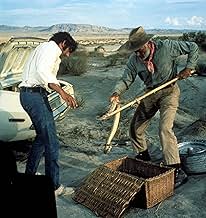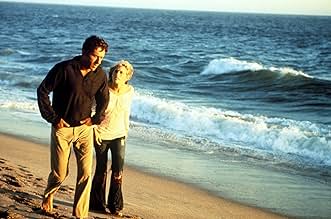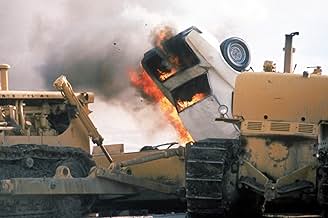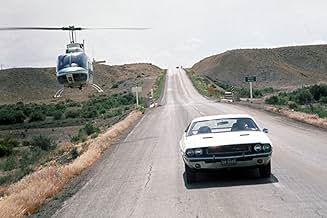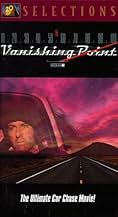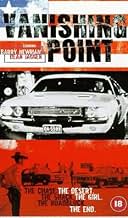IMDb-BEWERTUNG
7,2/10
31.790
IHRE BEWERTUNG
In den 1970er Jahren liefert der Autozulieferer Kowalski Hot Rods in Rekordzeit, gerät aber immer wieder in Schwierigkeiten mit den Autobahnpolizei.In den 1970er Jahren liefert der Autozulieferer Kowalski Hot Rods in Rekordzeit, gerät aber immer wieder in Schwierigkeiten mit den Autobahnpolizei.In den 1970er Jahren liefert der Autozulieferer Kowalski Hot Rods in Rekordzeit, gerät aber immer wieder in Schwierigkeiten mit den Autobahnpolizei.
- Regie
- Drehbuch
- Hauptbesetzung
- Auszeichnungen
- 1 Nominierung insgesamt
Charlotte Rampling
- Hitch-Hiker
- (Gelöschte Szenen)
Robert Donner
- Deputy Collins
- (as Bob Donner)
Empfohlene Bewertungen
The best road movie ever made. To appreciate it you have got to try and see it from the culture of that era. It is totally anti establishment as was the mood of half of America. So the police are all idiots, the 'good ol boys' are either violent rednecks or passive disapproving onlookers. Kowalski is going to give those mid west conservatives something they won't forget, he's going to shake things up for a day or two. Kowalski is simply the symbol of the many disenfranchised at the time. The story starts at the end. We hear a boring stifling radio news item on the price of grain. We see dreary looking bystanders who need to be turned on. Then Super Soul takes over the airwaves with his wild DJ antics and hippy music trying to jolt these people out of their fixed ways. The old and the new are clashing. This sets the mood we know from then it is rebellious. Other aspects the stunts the music the characters have been well covered below so there is no need to say more on that. Some have said that there is no point to this story or Kowalski's motives and have interpreted the title meaning that. But all a vanishing point is an artist name for the phenomena of perspective where two parallel lines seemingly meet and in the long straight roads of the journey we see plenty of vanishing points.
10AdamKey
Richard Sarafian's 1971 film "Vanishing Point" is, for starters, a fascinating study of those persons anthropologists sometimes term "marginal men"--individuals caught between two powerful and competing cultures, sharing some important aspects of both but not a true part of either, and, as such, remain tragically confined to an often-painful existential loneliness. Inhabiting a sort of twilight zone between "here" and "there," a sort of peculiar purgatory, these restless specters cannot find any peace or place, so they instead instinctively press madly on to some obscure and unknown destination, the relentless journey itself being the only reason and justification.
Disc jockey Super Soul (Cleavon Little) and delivery driver Kowalski (Barry Newman) are two of these specters, marginal but decent, intelligent men who can't or won't live in burgeoning competing cultures which in reality have offered them very little of worth or substance, despite their own personal sacrifices. Kowalski himself had tried to "fit in" with the Establishment as a soldier and police officer and later, attempted to do the same with the blossoming 1960s counterculture, but soon disappointingly found that they both were ridden with their own various forms of dishonesty and insincerity. Personal honor, self-reliance and genuine respect--Kowalski's stock in trade--were tragically valued very little by either, despite each one's shrill and haughty claims to the contrary.
Moreover, it's no accident Newman's character has a Polish surname; the Poles throughout their history have created a very rich and unique Slavic culture largely based upon just such a "marginality"--being geographically jammed between powerful historic enemies, Germany and Russia, and never being able to fully identify with either one, at often great cost to themselves. It's also no accident Little's character is blind and black, the only one of his kind in a small, all-Caucasian western desert town--his sightlessness enhancing his persuasiveness and his ability to read Kowalski's mind, the radio microphone his voice, his race being the focus of long simmering and later suddenly explosive disdain--all of the characteristics of a far-seeing prophet unjustly (but typically) dishonored in his own land.
The desert environment also plays a key role in cementing the personal relationship between and respective fates of these two men--to paraphrase British novelist J.G. Ballard, prophets throughout our history have emerged from deserts of some sort since deserts have, in a sense, exhausted their own futures (like Kowalski himself had already done) and thus are free of the concepts of time and existence as we have conventionally known them (as Super Soul instinctively knew, thus creating his own psychic link to the doomed driver.) Everything is somehow possible, and yet, somehow nothing is.
Finally, VP is also a "fin de siecle" story, a unique requiem for a quickly dying age- a now all-but-disappeared one of truly open roads, endless speed for the joy of speed's sake, of big, solid no-nonsense muscle cars, of taking radical chances, of living on the edge in a colorful world of endless possibility, seasoned with a large number and wide variety of all sorts of unusual characters, all of which had long made the USA a wonderful place--and sadly is no longer, having been supplanted by today's swarms of sadistic, military-weaponed cop-thugs, obsessive and intrusive safety freaks, soulless toll plazas, smug yuppie SUV drivers, tedious carbon-copy latte towns, and a childish craving for perfect, high-fuel-efficiency safety and security.
The just-issued DVD contains both the US and UK releases of the film; the UK release, I believe, is a much more satisfying film, as it has the original scenes deleted from the US version. As an aside, Super Soul's radio station call letters, KOW, are in fact the ones for a country & western station in San Diego.
Disc jockey Super Soul (Cleavon Little) and delivery driver Kowalski (Barry Newman) are two of these specters, marginal but decent, intelligent men who can't or won't live in burgeoning competing cultures which in reality have offered them very little of worth or substance, despite their own personal sacrifices. Kowalski himself had tried to "fit in" with the Establishment as a soldier and police officer and later, attempted to do the same with the blossoming 1960s counterculture, but soon disappointingly found that they both were ridden with their own various forms of dishonesty and insincerity. Personal honor, self-reliance and genuine respect--Kowalski's stock in trade--were tragically valued very little by either, despite each one's shrill and haughty claims to the contrary.
Moreover, it's no accident Newman's character has a Polish surname; the Poles throughout their history have created a very rich and unique Slavic culture largely based upon just such a "marginality"--being geographically jammed between powerful historic enemies, Germany and Russia, and never being able to fully identify with either one, at often great cost to themselves. It's also no accident Little's character is blind and black, the only one of his kind in a small, all-Caucasian western desert town--his sightlessness enhancing his persuasiveness and his ability to read Kowalski's mind, the radio microphone his voice, his race being the focus of long simmering and later suddenly explosive disdain--all of the characteristics of a far-seeing prophet unjustly (but typically) dishonored in his own land.
The desert environment also plays a key role in cementing the personal relationship between and respective fates of these two men--to paraphrase British novelist J.G. Ballard, prophets throughout our history have emerged from deserts of some sort since deserts have, in a sense, exhausted their own futures (like Kowalski himself had already done) and thus are free of the concepts of time and existence as we have conventionally known them (as Super Soul instinctively knew, thus creating his own psychic link to the doomed driver.) Everything is somehow possible, and yet, somehow nothing is.
Finally, VP is also a "fin de siecle" story, a unique requiem for a quickly dying age- a now all-but-disappeared one of truly open roads, endless speed for the joy of speed's sake, of big, solid no-nonsense muscle cars, of taking radical chances, of living on the edge in a colorful world of endless possibility, seasoned with a large number and wide variety of all sorts of unusual characters, all of which had long made the USA a wonderful place--and sadly is no longer, having been supplanted by today's swarms of sadistic, military-weaponed cop-thugs, obsessive and intrusive safety freaks, soulless toll plazas, smug yuppie SUV drivers, tedious carbon-copy latte towns, and a childish craving for perfect, high-fuel-efficiency safety and security.
The just-issued DVD contains both the US and UK releases of the film; the UK release, I believe, is a much more satisfying film, as it has the original scenes deleted from the US version. As an aside, Super Soul's radio station call letters, KOW, are in fact the ones for a country & western station in San Diego.
Just received a DVD of this film and was pleasantly surprised. The image is restored and looks great. After years of watching grainy and scratched prints its nice to see it as it was in 1971. Theatrical trailer and two TV spots are included. Commentary by Richard C. Sarifian brings some insights into filming locations, the various actors, etc. (Gilda Texter was severely sunburned during her desert motorcycle ride and she was girl friend of actor Paul Koslo who also appears in film.) And a story of a prostitute befriended by the crew,who stole the last remaining challenger. (eight were used, only one survived.) She was caught sometime later. The real treat is actress
Charlotte Ramplings missing scene near the end of the film. While it really adds nothing to the story,its nice to finally see the missing footage after thirty years. There are also some striking images of the challenger at daybreak in that previously missing scene. The only thing lacking is commentary from the STAR of the film, Barry Newman,which would have made this a Great DVD.
Charlotte Ramplings missing scene near the end of the film. While it really adds nothing to the story,its nice to finally see the missing footage after thirty years. There are also some striking images of the challenger at daybreak in that previously missing scene. The only thing lacking is commentary from the STAR of the film, Barry Newman,which would have made this a Great DVD.
Kowalski transports cars across the western US in 1970. He gets a gig transporting a 1970 Dodge Challenger R/T from Denver to San Francisco and sets out at maximum warp, stopping only for gas and strategy. He commits no crime outside of speeding, and fleeing the cops who are trying to stop him simply because he will not stop. He finds allies along the way, including an old prospector, a DJ named Super Soul, and a hippie who seems to me to be an alternate ending to the life of Peter Fonda's character Wyatt in "Easy Rider". He drives and drives and drives until he meets his destiny in a tiny town on the California-Nevada border at 10:04 AM on some unnamed Sunday.
Why? Is it because of his past; ex-cop, ex-racer, tragically bereaved? Is it because of the truckload of speed he takes at the beginning of the movie (draw your own metaphors between Kowalski's internal use of the noun and external use of the verb)?
Or is it the road, the infinite expanses of the Southwest, the silence, the freedom, the sound of the motor surging, the tires spinning, the wheels gobbling up and sitting out the black asphalt? Who knows? Kowalski seems indifferent as to why he drives, only that he must drive, must evade, must get to where he is going and will not - can not - be stopped.
Do yourself a favor. Rent the original, don't see the '97 made for TV movie (it has some high points, but it's like watching the '99 "Psycho" before seeing the Alfred Hitchcock original). In fact, rent this and "Two Lane Blacktop" from Monte Hellman, and "Mad Max" and/or "The Road Warrior". Watch all of them in as close to one sitting as you can get.
If after watching these movies, you don't understand how they're expressions of the same call to the open road, return them and give up. Not everyone was meant to hear it, just like not everyone has perfect pitch or the ability to wiggle their ears.
This movie drove me (pun intended) to take the handle kowalski and buy a Challenger of my own (flame red, 1973, you see the 1970 R/Ts are very hard to get).
It probably won't do the same for you, but if you've ever been driving down the open road and wondered what would happen if you _didn't_ get off at the next exchange, in fact if you never got off at all, then this film is for you.
And I hope the next ignoramus who compares this masterful film to "The Dukes of Hazzard" loses his brakes and plows into a line of parked Harleys outside some bar with a name like Whiskey Junction or the Dew Drop Inn.
Why? Is it because of his past; ex-cop, ex-racer, tragically bereaved? Is it because of the truckload of speed he takes at the beginning of the movie (draw your own metaphors between Kowalski's internal use of the noun and external use of the verb)?
Or is it the road, the infinite expanses of the Southwest, the silence, the freedom, the sound of the motor surging, the tires spinning, the wheels gobbling up and sitting out the black asphalt? Who knows? Kowalski seems indifferent as to why he drives, only that he must drive, must evade, must get to where he is going and will not - can not - be stopped.
Do yourself a favor. Rent the original, don't see the '97 made for TV movie (it has some high points, but it's like watching the '99 "Psycho" before seeing the Alfred Hitchcock original). In fact, rent this and "Two Lane Blacktop" from Monte Hellman, and "Mad Max" and/or "The Road Warrior". Watch all of them in as close to one sitting as you can get.
If after watching these movies, you don't understand how they're expressions of the same call to the open road, return them and give up. Not everyone was meant to hear it, just like not everyone has perfect pitch or the ability to wiggle their ears.
This movie drove me (pun intended) to take the handle kowalski and buy a Challenger of my own (flame red, 1973, you see the 1970 R/Ts are very hard to get).
It probably won't do the same for you, but if you've ever been driving down the open road and wondered what would happen if you _didn't_ get off at the next exchange, in fact if you never got off at all, then this film is for you.
And I hope the next ignoramus who compares this masterful film to "The Dukes of Hazzard" loses his brakes and plows into a line of parked Harleys outside some bar with a name like Whiskey Junction or the Dew Drop Inn.
Many people don't know where the radio d.j. was broadcasting from in the movie. He was broadcasting from the then closed Goldfield Hotel, in beautiful "downtown" Goldfield Nevada! I should know! I was a resident in this picturesque little town of 110 people (in 1971). The Goldfield Hotel has since found new life as a restored historical landmark. The town itself has surged in population due to new mining processes, and the re-opening of the long closed mines. During the movie, a scene picturing the front of the "Green Frog Market", you will see the faint glow of a freckle-faced, red headed little boy, gazing out of the window......yeah..it's me!! This movie was quite exciting in a town of 110 people!
Wusstest du schon
- WissenswertesIn an interview, actor Paul Koslo spoke about legendary stunt driver Cary Loftin; "One night coming home from location, Cary was driving one of the Challengers back to the hotel, and he passed some New Mexico state troopers going 145 miles an hour! [laughs] He had four or five cop cars behind him with their lights on, but they couldn't catch up because they could only go about 125! So he drove into this little town and started to shut the car down. He pulled into a gas station, and I swear to God, he did a 360 in between the pumps and put the rear of the car - the gas tank - right in front of the super pump! He got out of the car like nothing happened, and the troopers busted his ass right there! [laughs] Oh, you should've seen those cops! They were fuming! They took him in, and the producer had to explain to them that Cary had actually been testing the car - that he did a lot of these spinouts because he'd been having trouble with the car! [laughs] I mean, you do have to test the cars, but you don't do it while you're driving home!"
- PatzerThe 19-inch racks in Super Soul's radio station with large tape reels (in one scene seen fast moving) are not audio equipment. These tape drives were used in computer systems in the 1970s to store data on tape.
- Zitate
Super Soul: This radio station was named Kowalski, in honour of the last American hero to whom speed means freedom of the soul. The question is not when's he gonna stop, but who is gonna stop him.
- Crazy CreditsThe Fox logo is shown without the fanfare making it one of the first times this has happened.
- Alternative VersionenWhen first released in Brazil, the movie had some scenes cut, reducing the running time to 99 minutes.
- SoundtracksYou Got to Believe
Composed by Delaney Bramlett
Sung by Delaney & Bonnie & Friends
(Courtesy of Atlantic Records)
Top-Auswahl
Melde dich zum Bewerten an und greife auf die Watchlist für personalisierte Empfehlungen zu.
Details
- Erscheinungsdatum
- Herkunftsland
- Sprache
- Auch bekannt als
- Fluchtpunkt San Francisco
- Drehorte
- Goldfield Hotel, Goldfield, Nevada, USA(KOW radio station)
- Produktionsfirma
- Weitere beteiligte Unternehmen bei IMDbPro anzeigen
Box Office
- Budget
- 1.585.000 $ (geschätzt)
- Bruttoertrag in den USA und Kanada
- 12.442.673 $
- Weltweiter Bruttoertrag
- 12.443.722 $
- Laufzeit
- 1 Std. 39 Min.(99 min)
- Farbe
- Seitenverhältnis
- 1.85 : 1
Zu dieser Seite beitragen
Bearbeitung vorschlagen oder fehlenden Inhalt hinzufügen


